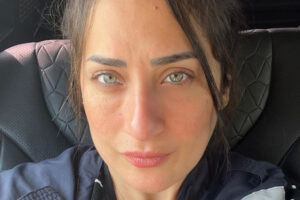This Palestinian doctor fundraised in Melbourne. Now her heart breaks as children die in Gaza

Save articles for later
Add articles to your saved list and come back to them any time.
For the first time in her career, Dr Enas Kabar is unable to help her patients.
The Palestinian doctor has no access to medications or the vital health services that keep the sick alive, such as dialysis or chemotherapy.
Dr Enas Kabar, a doctor working in Gaza.
“What is happening is breaking my heart,” Kabar said, her voice quavering down a phone line from the southern Gazan city of Rafah.
“Some people only think of the bombing and the death, but it’s also painful to see people with chronic diseases suffer.”
The desperate situation Kabar finds herself in is worlds apart from the calm streets of Melbourne and Sydney that she visited in February as part of a fundraising trip for Save a Child’s Heart, a charity that funds and organises heart operations for Palestinian children in Israel.
During Kabar’s visit to Australia, she struck up a friendship with Melbourne businessman Ron Finkel, who is the founder and chair of another charity close to her heart, Project Rozana.
They ate a lunch of baked salmon, soup and salad at Finkel’s house in Caulfield with the charity’s director of engagement, Palestinian Muhammed Asideh.
Ron Finkel, founder of Project Rozana, an international charity that funds healthcare services in Gaza.Credit: Luis Ascui
Project Rozana aims to improve relations between Israelis and Palestinians through training for healthcare workers and the provision of better health services. This includes a daily bus services that ferries sick Palestinian children — who are unable to access chemotherapy or dialysis in Gaza — to Israeli hospitals for treatment.
But as Israel’s war on Hamas enters its ninth week, none of the children supported by the charity have been able to cross the border for the life-saving treatment.
“They have started to die because of the loss of medical care,” Kabar says. “This is a health disaster.”
The 34-year-old is having increasingly difficult conversations with patients, many of whom have fled their bombed homes with just the clothes on their back.
One father asked her what to do when his epileptic son next had a seizure. He had run out of medication.
Another man, who was sleeping on the streets after his house had been bombed, asked Kabar if she could find accommodation for his family.
“I feel like I am weak,” she said. “I can’t do anything for the people.”
Kabar is among around 1.9 million Palestinians who the United Nations estimates have been displaced from their homes since the Israeli military began bombing Gaza early last month in retaliation for Hamas’ deadly attack on southern Israel on October 7, which killed about 1200 people.
Israel’s military response has killed more than 17,400 people in Gaza, according to the Palestinian territory’s Health Ministry. The ministry does not differentiate between civilian and combatant deaths.
Kabar says three of her relatives are among the dead.
She has lost contact with her seven and 10-year-old sons, who are living with her ex-husband in a shelter in Khan Younis, another city in southern Gaza.
Kabar is living in a shelter while she helps the International Medical Corps create a field hospital in Rafah. She has been pulling together a team of surgeons, physiotherapists and anaesthetists who will respond to the growing casualties.
Amid the devastation, Kabar has remained in regular contact with Finkel via Whatsapp.
“She is really engaging and passionate about her work,” he said. “She’s a terrific person who’s living a nightmare.”
Project Rozana is underpinned by the concept of “healthcare diplomacy”, which Finkel describes as the power of health to build trust and peace between people.
It was something Finkel experienced first-hand during his regular visits to Israeli hospitals in the early 2000s for his work with another healthcare charity.
“There was crazy stuff happening on the outside … terrorism, buses being blown up … but the hospital was like a parallel universe,” he recalled. “There were teams of Israeli Jews, Israeli Arabs and Palestinian doctors, all working together to treat patients. It’s a place where opportunity exists, not fear or hate.”
As well as transporting sick children, Project Rozana trains Palestinian and Israeli doctors and nurses across 14 hospitals in Gaza, the West Bank, East Jerusalem and Israel.
It also funds scholarships for Palestinian doctors to undertake subspecialty training in Israeli hospitals. In recent times, it has been supplying essential medical supplies and equipment to overwhelmed Palestinian hospitals.
Has the ongoing conflict set back the organisation’s goal of healthcare diplomacy?
“No, it has reinforced it,” Finkel said.
“Doctors, nurses and allied health professionals have a common language: the language of health. They are committed to making people better. It’s a good place to start.”
The Morning Edition newsletter is our guide to the day’s most important and interesting stories, analysis and insights. Sign up here.
Most Viewed in National
From our partners
Source: Read Full Article


